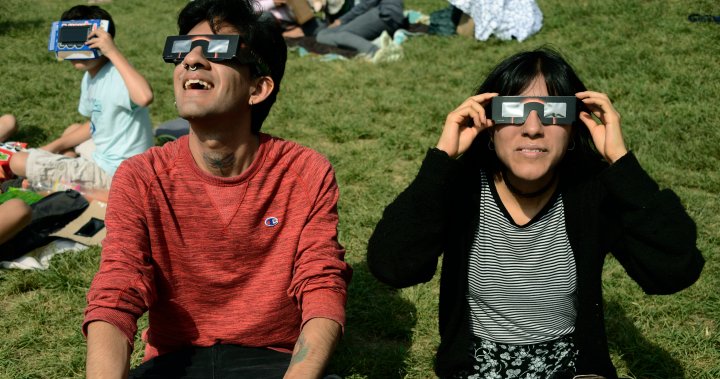As space enthusiasts in some parts of Canada gear up to experience a once-in-a-lifetime total solar eclipse on Monday, they should know that red and green are optimal colours to wear during the event.
This is because of a phenomenon called the Purkinje effect, first described by Czech physiologist Johannes Purkinje in 1823.
Purkinje found that in bright environments, red colours appear more luminous than blue, but in low-light environments, those same blues appear much brighter than reds, according to a web book published by professor emeritus Peter Kaiser of York University.
Purkinje noticed this phenomenon while walking around in the early dawn. In the dim light, the red flowers around him appeared inky black, according to the Oxford Reference.
During the total solar eclipse, you should be able to see this phenomenon play out. Bright red clothing may appear darker and faded while blues and greens appear more vibrant.
This effect also occurs as day slowly shifts to night, especially in the twilight hours. But during the eclipse, the effect should appear even more pronounced as the shift from bright light to low light happens much more quickly, according to Jeff Horvis, an associate professor at the University of Waterloo’s School of Optometry and Vision Science.
“Things happen a little bit quicker. So you don’t really have time to adapt to all the changes in the light level,” Horvis told Global News.
Horvis recommends wearing red and green together, to see an even bigger contrast as the moon blocks out the sun during the total eclipse.
“The closer together the two colours are, the easier it is to perceive the difference.”
The email you need for the day’s
top news stories from Canada and around the world.
But why does this effect happen? It has to do with the way that our eyes react to changing light conditions.
There are two kinds of light receptor cells in the human eye, called rods and cones.
In dim light conditions, rods take a more active role in our vision and help us see in the dark, Kaiser explains in his book. In bright conditions, cones, which detect colour, are more active.
This is why colours appear more muted in the dark; our cone receptors aren’t getting enough light to perceive colour.

Another feature of rods and cones is that they’re receptive to different wavelengths of light.
The reason we see red objects as red is because they reflect back a long wavelength of light. When the wavelength of light is short, the colour appears more green and blue.
Rods are more sensitive to short wavelengths. So, when our vision is dominated by rods, like in dim light conditions, blues and greens appear brighter.
It has nothing to do with the colour itself — it’s just how our brain perceives it.
This is also why the Purkinje effect cannot be captured by digital cameras. It’s fundamentally a quirk of our human eyes.
“What we’re seeing with the Purkinje effect isn’t actually happening. It’s just the way our eyes and brains are interpreting light,” said Will Snyder, manager of the Saint Louis Science Center’s planetarium, in an interview with CNN.
“As we get into the totality with the darkening of the sky, our eyes don’t have time to keep up with those changes, so one of the consequences is things that are red tend to look much more muted [in comparison with] things that are blue or green in colour.”
Of course, wearing red and green during the eclipse is optional. But one thing all eclipse watchers should be wearing on Monday are eclipse glasses. Though the sun will dim during the eclipse, it can still do permanent damage to your eyes if you look straight at it.
Horvis notes that the Purkinje effect may be more apparent if eclipse observers take off their eclipse glasses and look at their surroundings (never look at the sun without protective equipment). This is because eclipse glasses are very dark, so the sudden shift in light level after taking them off may make the Purkinje effect more obvious.
“It would be most obvious right after they took the eclipse glasses off,” he said.
People who observe the solar eclipse outside the path of totality can still see the Purkinje effect, though it may not be as pronounced.
© 2024 Global News, a division of Corus Entertainment Inc.






